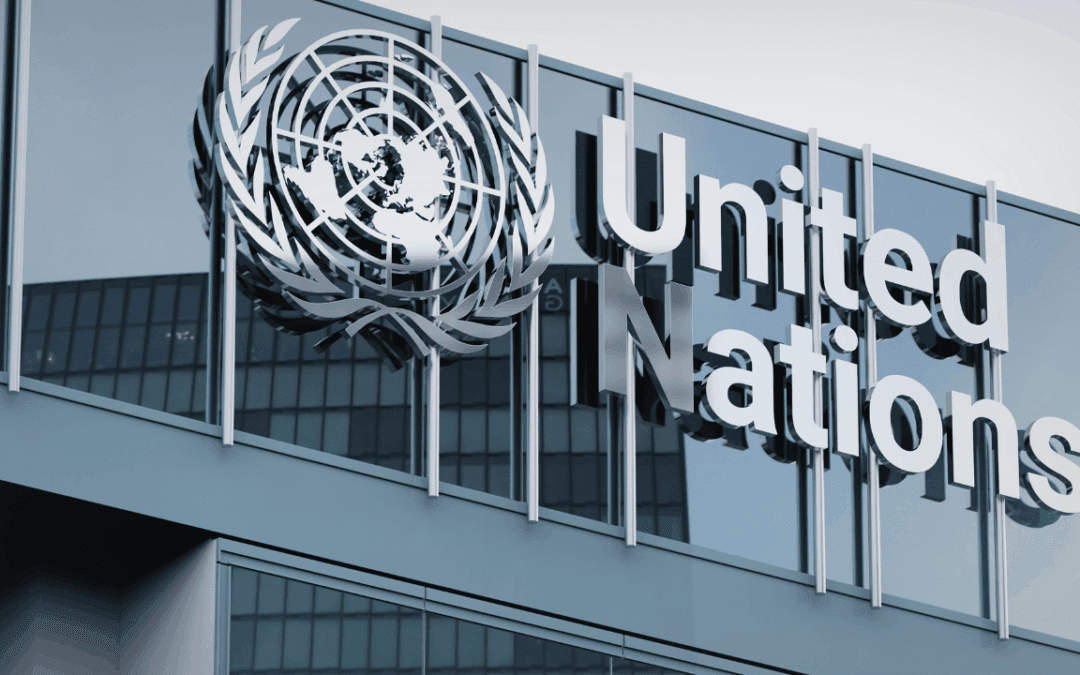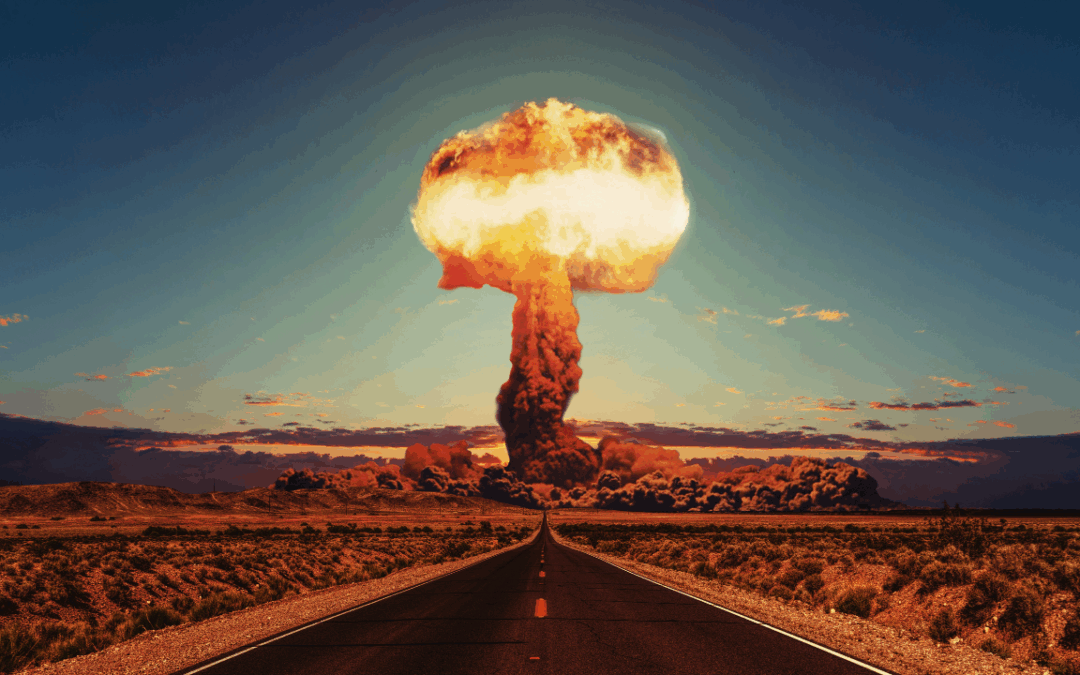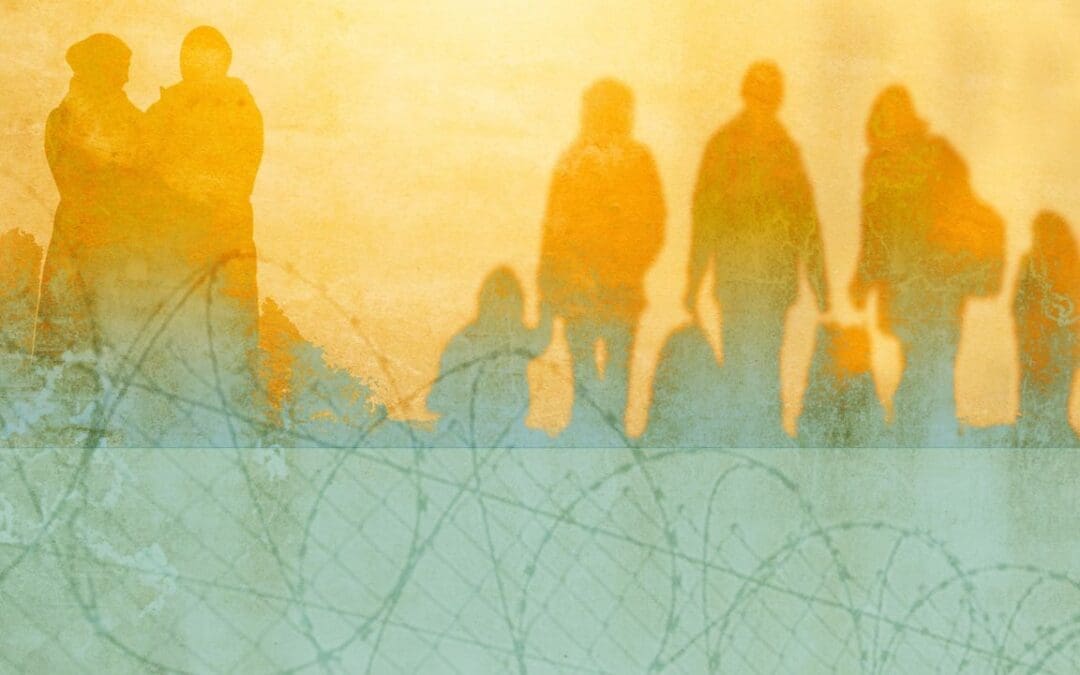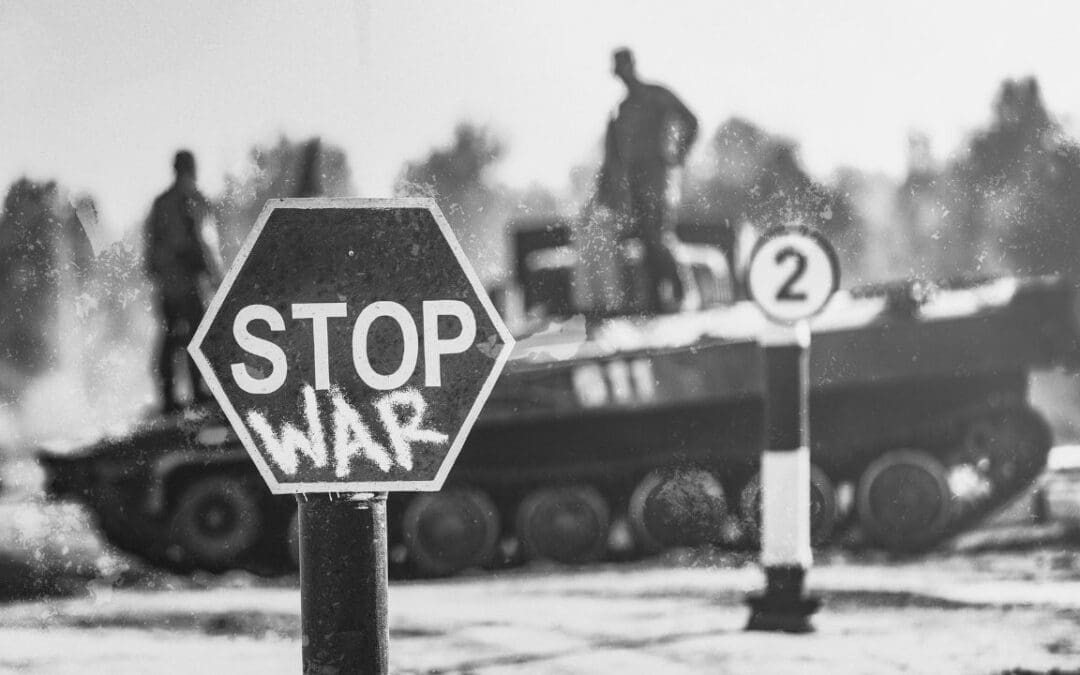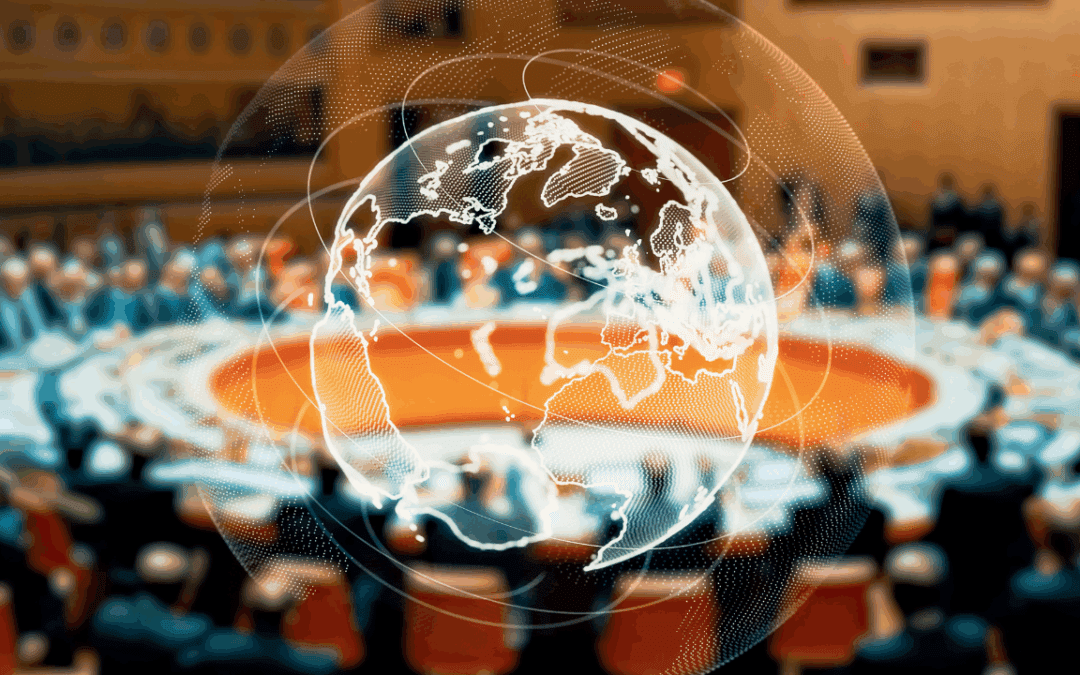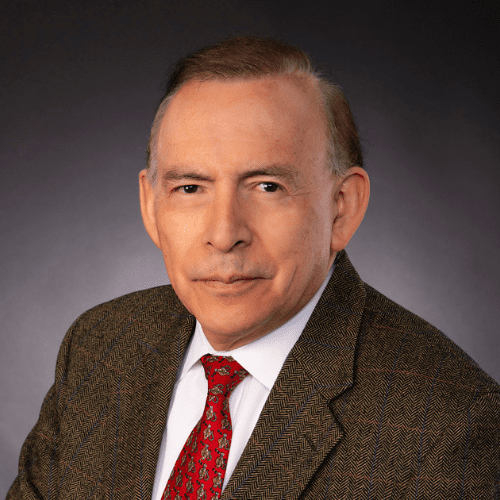
by Lawrence Wittner | Nov 25, 2025 | UN Reform
Although the world is experiencing severe global crises, there are new efforts underway to create a more effective means of coping with them.
The crises are clear enough. They include vast slaughter in horrific wars, worldwide climate catastrophe, massive population displacement, and deepening poverty.
Moreover, these disastrous situations are likely to worsen in coming years. Modern wars are fought with increasingly devastating weapons, and preparations for nuclear war have escalated to the level of global annihilation. Similarly, time is running out for saving the planet from an environmental cataclysm, which will surely lead to heightened displacement and poverty.
There is, of course, a global organization formally tasked with tackling global problems: the United Nations. And the officials of that international entity do frequently make admirable recommendations for how these problems can be solved. Indeed, there is a consensus among most of the UN’s 193 nations about what should be done to preserve a decent future for humanity: end the wars; foster nuclear disarmament; sharply reduce the burning of fossil fuels; assist refugees; promote social progress; and feed the hungry.
The problem is that the United Nations, despite its virtues, remains at the mercy of the major military and economic powers that created it. And they are not only frequently at odds with one another, but are usually determined to see to it that their national interests―as they define them―prevail over the interests of the world community.
When it comes to international security, each of the five permanent members of the UN Security Council (Britain, China, France, Russia, and the United States) can veto UN action―and all too often do so.
When it comes to UN efforts to address climate change, the situation is not much better, for the great powers continue to burn and (as in the case of Russia and the United States) extract and profit from selling vast quantities of fossil fuel. Consequently, they weaken or sabotage UN-sponsored climate agreements.
Another way the great powers hamstring the United Nations is by abandoning its operations and reducing its meager funding. The U.S. government, under Donald Trump, is particularly flagrant in this regard, pulling the United States out of key UN agencies and slashing voluntary contributions and mandated dues payments to the world organization. As of this October, the United States has compiled a debt of $1.5 billion in mandated funding to the United Nations, followed by China ($192 million) and Russia ($72 million).
Frustrated by the UN’s inability to adequately handle global challenges, a network of civil society organizations, scholars, policy experts, and diplomats took action on September 22, 2025 to launch Article 109, an international coalition to mobilize public opinion, social movements, and national governments to activate a UN Charter Review conference.
When the UN Charter was signed in 1945, the document’s drafters provided for its evolution through Article 109, which states that a Charter Review Conference can be launched by a two-thirds vote of the General Assembly and any nine (formerly seven) members of the Security Council. As today’s Article 109 Coalition observes, this conference could update and empower the United Nations by enacting structural changes (e.g., reforming the Security Council, creating a UN Parliamentary Assembly, and establishing a Climate Council), as well as by making normative upgrades (e.g., supporting gender equality).
More than 40 civil society organizations are now part of the Article 109 Coalition. They include global campaigning organizations like Oxfam International, Democracy Without Borders, the Global Governance Forum, and the World Federalist Movement/Institute for Global Policy; regional organizations in Africa and Latin America; think tanks like the Quincy Institute for Responsible Statecraft; and national organizations like EYC (which empowers youth in Cambodia) and Citizens for Global Solutions (which organizes in the United States). The Club de Madrid, a recent endorser of Charter review, is a forum that brings together more than 100 former Heads of State.
Indeed, recent heads of state and current government officials participated prominently in the September 22 launch event. Mary Robinson, former Irish President and UN High Commissioner for Human Rights, delivered the keynote address. She was followed by Alexander De Croo (former Belgian Prime Minister), Helen Clark (former New Zealand Prime Minister and UN Development Program Administrator), and Ambassador Muhammadou Kah (The Gambia’s Permanent Representative to the UN in Geneva).
UN Charter review has several potential drawbacks. For example, it could end up producing an amendment that reduces the purview of the international organization. Furthermore, the process will be lengthy. The Article 109 Coalition envisions a UN vote in 2027 to authorize a Charter review conference to convene in 2030. Finally, any amendment to the Charter must be ratified not only by two thirds of the UN membership, but by all permanent members of the Security Council―the five great powers that have helped enfeeble the world organization.
But these obstacles could be overcome. If there is a major campaign to strengthen the UN among members of the public, organizations, and nations, an amended Charter is likely to produce a more robust international institution. In addition, delaying a review conference until 2030 will provide the Article 109 campaign with the time to gather momentum and, also, increase the likelihood that some or all the world’s most stridently nationalist rulers (e.g., Trump, Vladimir Putin, and Benjamin Netanyahu) are no longer in office. Indeed, who really knows what kind of reforms the leadership of the Security Council’s five permanent members would be willing to accept in the future, especially if global conditions worsen and there is substantial worldwide pressure for action?
Farsighted national leaders, at least, are ready for the challenge and, like Brazilian President Luiz Inácio Lula da Silva, are busy organizing for UN Charter Review. Addressing the September 2025 launch of the Article 109 campaign, Ireland’s Mary Robinson spoke out decisively for UN empowerment, proclaiming: “The moment has come, and we need to be brave.”

by Lawrence Wittner | Oct 30, 2025 | Disarmament
Early this year, legislators in the U.S. House of Representatives and in the U.S. Senate introduced resolutions that call upon the U.S. government to lead a global effort to halt and reverse the nuclear arms race. Co-sponsored by 36 members of the House and 5 members of the Senate, H. Res. 317 and S. Res. 323 urge the U.S. government to pursue nuclear disarmament, renounce the first use of nuclear weapons, end sole presidential authority to launch them, cancel plans for new, enhanced nuclear weapons and delivery systems, maintain the current moratorium on nuclear testing explosions, and provide a just economic transition for impacted communities.
The context for these antinuclear measures is an escalating nuclear arms race that is rapidly spiraling out of control. In recent years, Russia and the United States, which together possess 87 percent of the world’s nuclear weapons, have scrapped nearly all their nuclear arms control agreements. The only exception is the New Start Treaty, which is scheduled to expire in February 2026. Meanwhile, all nine nuclear powers (Russia, United States, Britain, France, China, Israel, India, Pakistan, and North Korea) have committed themselves to dramatically upgrading their nuclear arsenals. The U.S. government, for example, at the enormous cost of $1.7 trillion, is currently engaged in revamping its entire nuclear weapons complex and building an array of new, more devastating nuclear weapons.
This worldwide nuclear weapons buildup has been accompanied by a revival of public threats by the leaders of nuclear-armed nations to initiate nuclear war―threats that have been issued, repeatedly, by Donald Trump, Kim Jong Un, and Vladimir Putin. Not surprisingly, the Doomsday Clock of the Bulletin of the Atomic Scientists currently stands at 89 seconds to midnight, the most dangerous setting in its history.
The House and Senate resolutions seeking to halt and reverse this race toward catastrophe are primarily the product of the Back from the Brink campaign. Founded in 2017 by the leaders of two U.S. national organizations, Physicians for Social Responsibility and the Union of Concerned Scientists, Back from the Brink has emerged as an impressive coalition of organizations, individuals, and public officials working together to create a world free of nuclear weapons.
At this point, the Back from the Brink campaign has secured the endorsement of a significant number of additional national organizations, including peace and disarmament groups like the American Friends Service Committee, the Federation of American Scientists, Pax Christi USA, Peace Action, and Veterans for Peace, religious organizations like the Episcopal Church, the Presbyterian Church, the Unitarian Universalist Association, and the United Church of Christ, environmental groups like 350.org, the Natural Resources Defense Council, and the Sierra Club, political activist groups like the Hip Hop Caucus and Indivisible, and governmental organizations like the United States Conference of Mayors.
In addition, the campaign has attracted the support of hundreds of local peace, academic, civic, environmental, health, policy, religious, and other organizations, as well as endorsements from 78 municipalities and counties, 8 state legislative bodies, 488 municipal and state officials, and 53 members of Congress.
Despite this array of support, Back from the Brink’s immediate prospects are not good. Its antinuclear resolutions, now awaiting action by the Republican-controlled House and Senate, seem unlikely to pass, as not a single Republican legislator has signed on as a co-sponsor of them thus far. Nor is it likely that President Donald Trump, who seems enamored with U.S. military “strength,” will champion halting, much less reversing, the nuclear arms race.
Longer term, however, the prospects are brighter. Unlike the Republican Party of recent decades, the Democratic Party has championed a variety of nuclear arms control and disarmament measures. Thus, if the Democrats do well in the 2026 midterm elections and, thereby, retake control of the House and the Senate, there is a reasonable chance that they will pass Back from the Brink’s antinuclear resolutions. Also, if the Democrats hold on to Congress and win the presidency in 2028, it’s quite possible that nuclear arms control and disarmament will appear once again on the U.S. government’s public policy agenda.
Of course, even if there are public policy advances along these lines, as there have been in the past, it will not end the immense danger of worldwide nuclear annihilation―a danger that emerged with startling clarity in 1945 with the advent and use of nuclear weapons to obliterate two Japanese cities. Ultimately, a secure future for civilization will be attained only when these weapons of mass destruction are abolished.
Is that feasible?
It’s certainly a possibility. After all, when directly confronted with the issue of human survival, most people have displayed an appropriate concern for it by demanding an end to the nuclear menace. And that goal could be attained by seeing to it that all nations sign and ratify the Treaty on the Prohibition of Nuclear Weapons. That landmark treaty, which was hammered out painstakingly at the United Nations in 2017 and which entered into force in 2021, has already been signed by 95 countries (a majority of the world’s nations) and ratified by 74 of them.
Admittedly, the nine nuclear powers, still clinging doggedly to their nuclear weapons, are not among them. But, if there were a mobilization of substantial public pressure and the development of international security guarantees enforced by a strengthened United Nations, the reluctance of these holdouts could be overcome and a nuclear weapons-free world established.
Meanwhile, to provide us with the time it will take to get to this state of affairs, we do need to focus on turning back from the brink of nuclear war.

by David Gallup | Oct 14, 2025 | Human Rights
More than 120 million people have been displaced from their homes due to war, climate change, political instability and oppression in the past few years, a figure that has doubled in the last decade. Millions more are living in vulnerable situations as stateless individuals, frequently unable to exercise even their most basic rights.
The population of displaced persons is larger than that of more than 220 countries and dependent territories. In other words, only 12 countries in the world have a population larger than 120 million people. As the UN High Commissioner for Refugees explains, “one out of every 67 people on the Earth” is displaced from their homes. More than “20 people are forced to flee every minute of every day” according to the International Rescue Committee. These figures do not even account for the day-to-day oppression that millions, if not billions, face but who are unable or reluctant to leave to seek a safe haven.
Most refugees in the world are either internally displaced in or are fleeing from the following countries: Afghanistan, Democratic Republic of Congo, Haiti, Myanmar, Palestine, Somalia, South Sudan, Sudan, Syria, Ukraine, Venezuela, and Yemen.
As violence, war, and climate destruction affect more countries and regions of the world, the growing numbers of refugees and migrants could put a strain on social systems. National governments have responded to immigration flows in different ways, some limiting immigrants from entering their claimed territories and others welcoming newcomers. Just five countries — Iran, Turkey, Colombia, Germany, and Uganda — have welcomed almost 40% of the world’s refugees and others fleeing persecution and war.
The nation-state system has created the “refugee” and “stateless person,” as well as the severe problems associated with being considered outside the law or without “legal” status. All human beings are legal and have rights that should be respected wherever they live. Yet, due to violations of their human rights frequently perpetuated by or ignored by national governments, thousands of people flee their homes and countries every day trying to find safety, stability, and asylum.
By dividing up the world into 200 or so different countries, we have created “in” and “out” groups, with some achieving dignity, acceptance, inclusion, and rights fulfillment, and others being treated as less than human, unable to meet their basic daily needs. This disparity of treatment destabilizes society.
Why should our fellow humans have to flee to have their rights and basic needs upheld? Why are millions stuck in refugee camps with inadequate food, housing, healthcare, education, and opportunity?
To have the kind of world in which the rights reaffirmed in various declarations and treaties such as the Universal Declaration of Human Rights, the International Covenant on Civil and Political Rights, and the International Covenant on Economic, Social, and Cultural Rights are fully met, we should all be able to claim, and then exercise, our rights no matter where we happen to live on the planet. Human rights and duties are not bound by territory; they are not dependent upon the nation-state in which one happens to be born or where one happens to live.
Human rights are innate and unalienable; we are born with them, and we cannot give them up. We have them simply by being human.
What if we were to claim a citizenship that inherently affirms our rights wherever we find ourselves on planet Earth?
If everyone had citizenship everywhere, statelessness would no longer exist, and only natural disasters would forcibly displace people. With world citizenship, if we do not like where we live, if we do not like the politics or the rulers, then we could choose to live somewhere else, rather than being forced to flee for our safety and livelihood.
World citizenship, as a valid and legal citizenship beyond any other status that someone may carry, would ensure that everyone has at least one citizenship which, in its inclusiveness, upholds our concomitant rights and duties.
Requiring all governments to respect world citizenship status legally is the next step – a step that will support millions of displaced persons, by ensuring that governments will begin to fulfill their obligations to respect refugees, stateless and displaced persons’ innate and unalienable rights. To promote respect for this highest citizenship status, global institutions of law, such as World Court of Human Rights and a World Parliament of the people, must be established.
World citizenship, as the highest level of allegiance, empowers us to focus on equity, justice, sustainability, unity, and harmony with each other and the Earth.
As long as we, the people of the world, allow the nation-state system to maintain the arbitrary and exclusive borders that divide humans from one another, immigration will continue to be viewed as a problem rather than as an educational, economic, political, and social opportunity. When we respect each other, our rights and duties, as world citizens, the entire earth will be a sanctuary of peace and safety for all.

by Lawrence Wittner | Oct 14, 2025 | Peace
Although Albert Einstein is best-known as a theoretical physicist, he also spent much of his life grappling with the problem of war.
In 1914, shortly after he moved to Berlin to serve as director of the Kaiser Wilhelm Institute of Physics, Einstein was horrified by the onset of World War I. “Europe, in her insanity, has started something unbelievable,” he told a friend. “In such times one realizes to what a sad species of animal one belongs.” Writing to the French author Romain Rolland, he wondered whether “centuries of painstaking cultural effort” have “carried us no further than . . . the insanity of nationalism.”
As militarist propaganda swept through Germany, accompanied that fall by a heated patriotic “Manifesto” from 93 prominent German intellectuals, Einstein teamed up with the German pacifist Georg Friedrich Nicolai to draft an antiwar response, the “Manifesto to Europeans.” Condemning “this barbarous war” and the “hostile spirit” of its intellectual apologists, the Einstein-Nicolai statement maintained that “nationalist passions cannot excuse this attitude which is unworthy of what the world has heretofore called culture.”
In the context of the war’s growing destructiveness, Einstein also helped launch and promote a new German antiwar organization, the New Fatherland League, which called for a prompt peace without annexations and the formation of a world government to make future wars impossible. It engaged in petitioning the Reichstag, challenging proposals for territorial gain, and distributing statements by British pacifists. In response, the German government harassed the League and, in 1916, formally suppressed it.
After the World War came to an end, Einstein became one of the Weimar Republic’s most influential pacifists and internationalists. Despite venomous attacks by Germany’s rightwing nationalists, he grew increasingly outspoken. “I believe the world has had enough of war,” he told an American journalist. “Some sort of international agreement must be reached among nations.” Meanwhile, he promoted organized war resistance, denounced military conscription, and, in 1932, drew Sigmund Freud into a famous exchange of letters, later published as Why War.
Although technically a Zionist, Einstein had a rather relaxed view of that term, contending that it meant a respect for Jewish rights around the world. Appalled by Palestinian-Jewish violence in British-ruled Palestine, he pleaded for cooperation between the two constituencies. In 1938, he declared that he would “much rather see reasonable agreement with the Arabs on the basis of living together in peace than the creation of a Jewish state.” He disliked “the idea of a Jewish state with borders, an army, and a measure of temporal power,” plus “the development of a narrow nationalism within our own ranks.”
The most serious challenge to Einstein’s pacifism came with the Nazi takeover of Germany in 1933 and the advent of that nation’s imperialist juggernaut. “My views have not changed,” he told a French pacifist, “but the European situation has.” As long as “Germany persists in rearming and systematically indoctrinating its citizens in preparation for a war of revenge, the nations of Western Europe depend, unfortunately, on military defense.” In his heart, he said, he continued to “loathe violence and militarism as much as ever; but I cannot shut my eyes to realities.” Consequently, Einstein became a proponent of collective security against fascism.
Fleeing from Nazi Germany, Einstein took refuge in the United States, which became his new home. Thanks to his renown, he was approached in 1939 by one of his former physics students, Leo Szilard, a Hungarian refugee who brought ominous news about advances in nuclear fission research in Nazi Germany. At Szilard’s urging, Einstein sent a warning letter to President Franklin Roosevelt about German nuclear progress. In response, the U.S. government launched the Manhattan Project, a secret program to build an atomic bomb.
Einstein, like Szilard, considered the Manhattan Project necessary solely to prevent Nazi Germany’s employment of nuclear weapons to conquer the world. Therefore, when Germany’s war effort neared collapse and the U.S. bomb project neared completion, Einstein helped facilitate a mission by Szilard to Roosevelt with the goal of preventing the use of atomic bombs by the United States. He also fired off an impassioned appeal to the prominent Danish physicist, Niels Bohr, urging scientists to take the lead in heading off a dangerous postwar nuclear arms race.
Neither venture proved successful, and the U.S. government, under the direction of the new president, Harry Truman, launched the nuclear age with the atomic bombing of Japan. Einstein later remarked that his 1939 letter to Roosevelt had been the worst mistake of his life.
Convinced that humanity now faced the prospect of utter annihilation, Einstein resurrected one of his earlier ideas and organized a new campaign against war. “The only salvation for civilization and the human race,” he told an interviewer in September 1945, “lies in the creation of a world government, with security of nations founded upon law.” Again and again, he reiterated this message. In January 1946, he declared: “As long as there exist sovereign states, each with its own, independent armaments, the prevention of war becomes a virtual impossibility.” Consequently, humanity’s “desire for peace can be realized only by the creation of a world government.”
In 1946, he and other prominent scientists, fearful of the world’s future, established the Emergency Committee of Atomic Scientists. As chair of the new venture, Einstein repeatedly assailed militarism, nuclear weapons, and runaway nationalism. “We shall require a substantially new manner of thinking,” he said, “if mankind is to survive.”
Until his death in 1955, Einstein continued his quest for peace, criticizing the Cold War and the nuclear arms race and calling for strengthened global governance as the only “way out of the impasse.”
Today, as we face a violent, nuclear-armed world, Einstein’s warnings about unrestrained nationalism and his proposals to control it are increasingly relevant.
P.S.: Albert Einstein was a member of the National Advisory Council of the World Federalist Association, the predecessor of the Citizens for Global Solutions Education Fund.

by Jerry Tetalman | Oct 14, 2025 | Peace, UN Reform
Since the Russian invasion of Ukraine, the major countries of the world have been aligning in two different blocs: NATO (which includes most European nations, the United States, and Canada), Japan, and South Korea, on one side, and Russia, China, North Korea, Iran, and India on the other. Both blocs of countries are supporting their side in the war with weapons, trade, or troops. The negotiations to end the Ukraine-Russia war have so far failed due to Vladimir Putin’s reluctance to engage. NATO has so far only supplied weapons and military support. Still, it has been careful not to confront Russia with troops directly―probably because Russia has a large nuclear arsenal and the United States and NATO are trying to avoid a full-scale war. This strategy, so far, has resulted in a protracted stalemate.
If allowed to spread and escalate, however, the Ukraine-Russia war might trigger World War III.
So, how does the United States deal with this dilemma? One option is to do more of what it has been doing: provide more weapons and sanctions, in the hope that they will bring Putin to the negotiating table in earnest. Another, more daring approach is to look at what causes war and then address the root cause of war.
We live in a world where most nations or groups of nations solve their disputes through military force rather than the force of law. But in some parts of the world, we have replaced war with law and government. For example, the European Union has created peace between its member states, such as France and Germany, countries that had fought bitterly against one another in World Wars I and II. Now these nations settle their disputes by voting in the European Parliament and the European Union courts.
Why has the European Union succeeded in creating peace among its members while the United Nations has failed in these efforts? The answer lies in the fact that the United Nations is based on treaty law, a voluntary system of agreements among nations that lacks an enforcement mechanism that true law uses.
A new, more powerful, and democratic United Nations, however, could create peace among the world’s countries. By convening a UN reform conference under Article 109 of the UN charter, it would be possible to engage the world’s nations in creating a rules-based system of international law that is enforceable rather than voluntary. Building a civilized world based on law and rules, rather than on military power, would create a global framework for peace, and hopefully, reverse the schism of the world into warring camps.
Would such a framework solve the Russia-Ukraine war? Not directly, but it would provide an institution capable of resolving it.
If left on their current trajectory, international relations and military conflict will soon reach a dark place that will be difficult to recover from. The alternative is not radical; indeed, rules and laws provide the basis of civilization, and today they are desperately needed at the international level. These can be provided by a structure of limited world government, similar to that of the European Union. Individual nations would remain free to develop their own laws dealing with their internal affairs, but, in international affairs, they would abide by the laws between countries. In this fashion, a small piece of sovereignty would be exchanged for a peaceful world.
The world’s nations can begin this process by invoking Article 109 of the UN Charter to call for a global conference to craft a new, more effective United Nations. For such a mission to succeed, many details must be worked out, but the alternative of more war and destruction is unacceptable.

by Jacopo DeMarinis | Oct 9, 2025 | World Federation
On September 18th, the United Nations Security Council, the principal organ of the United Nations entrusted with maintaining international peace and security, introduced a resolution demanding an immediate and permanent ceasefire in Gaza, the immediate release of all hostages, and the lifting of restrictions on humanitarian aid to prevent the growing famine. Fourteen members of the fifteen-member council voted in favor. One member, the United States, voted against it. The resolution was thrown out.
Does this seem fair to you? Well, this is par for the course at the UN Security Council. Five permanent members (P5)—China, the United Kingdom, the United States, Russia, and France—can veto any resolution, immediately discarding it. The significance of this is heightened by the fact that the Security Council’s resolutions are binding, unlike the more representative General Assembly, whose resolutions are merely recommendations. In the past, the Security Council has passed binding resolutions authorizing dozens of peacekeeping operations to address conflicts in the Balkans, Angola, Somalia, Haiti, and other countries.
Unfortunately, history has shown that the P5 will leverage their position in the Council to block a resolution that threatens their interests, as Russia did regarding a February 2022 Security Council resolution that would have demanded an end to the Ukraine war. More recently, Russia blocked a UN Security Council resolution calling an end to the civil war in Sudan. Since the inception of the Security Council in 1945, a veto has been cast 326 times; out of these, Russia has wielded the veto 161 times, the United States, 94 times, China, 21 times, and the United Kingdom and France, 32 and 18 times, respectively.
To enhance the P5’s accountability to other UN countries, the UN General Assembly recently passed a resolution urging the veto-casting member to provide an explanation for their decision. This resolution harks back to the 1950 UN General Assembly “Uniting for Peace ” resolution, which provided the General Assembly with the opportunity to address any matter pertaining to international peace that has paralyzed the UN Security Council.
“Great power” capture of the global landscape is also apparent in nuclear disarmament issues. The Treaty on the Non-Proliferation of Nuclear Weapons (NPT), which entered into force in 1970, requires nuclear weapons states, which include the P5, to negotiate the complete disarmament of their nuclear weapons. Despite this mandate, nine countries now have nuclear weapons and these countries are upgrading their “strategic nuclear forces,” in defiance of the NPT. Unsurprisingly, these same countries unanimously oppose the Treaty on the Prohibition of Nuclear Weapons (TPNW). The TPNW was borne out of non-nuclear weapons states’ frustration with noncompliance with NPT, by prohibiting any country party to the treaty from possessing nuclear weapons.
Then, there is climate change. Despite embracing green energy more, the world’s top polluters, including the United States and China, are still burning carbon dioxide at an unsustainable rate which threatens to raise global temperature increase to above the 1.5 degree Celsius limit set by the Intergovernmental Panel on Climate Change. This means that the worst effects of the climate crisis will not be averted. Furthermore, the fact that powerful countries like the United States have openly defied international climate treaties like the Paris Accords- which the United States withdrew from in 2020, rejoined in 2021, and then withdrew from again with the re-election of Donald Trump- weakens international climate coordination and fosters a culture of unaccountability and skepticism about global climate governance.
Furthermore, the COP29 conference last year in Baku is seen by many climate activists and governments in the Global South as a failure, albeit a step in the right direction. Wealthy countries agreed to commit $300 billion a year by 2035 to aid developing countries in reducing carbon dioxide emissions and transitioning to clean energy, which is far from the $1.3 trillion annually for climate financing that developing countries were pushing for. It’s ironic that the burden will be felt mainly by small island states and developing countries in the Global South that have contributed least to the crisis.
To address this climate injustice, the Pacific Island nation of Vanuatu initiated proceedings with the International Court of Justice (ICJ) in 2023, requesting an advisory opinion regarding the legal obligations of states with respect to climate change. Vanuatu’s decision to present a UN General Assembly resolution initiating climate proceedings with the ICJ was due mainly to the determined climate justice efforts of youth activists from Pacific Island states, including civil society organizations like World’s Youth for Climate Justice. While the ICJ’s advisory opinions are not legally binding on countries, the ICJ’s ruling will hopefully set a precedent regarding international action to address climate change. Updates regarding the ICJ’s climate case can be viewed here.
It’s clear that the big power-dominated international order is unsustainable. The Bulletin of the Atomic Scientists’ decision to move the Doomsday Clock to 90 seconds to midnight, the closest to complete catastrophe we’ve ever been, has highlighted the importance of constructing an international system characterized by political equality and social and economic justice. The actions detailed above- creating the TPNW, involving the ICJ in climate matters, holding the P5 accountable to the General Assembly, and proposals for comprehensive Security Council reform are a definite starting point.
However, we must treat not just the symptoms but also the underlying disease: gross global power imbalances. This requires strengthening international law and modifying and/or establishing global institutions. Civil society organizations like Democracy Without Borders and Citizens for Global Solutions advocate for establishing a United Nations Parliamentary Assembly, which would allow the citizens of the world to directly elect their UN representatives. This Parliamentary Assembly would eventually be empowered, in conjunction with the UN General Assembly, to pass universally binding resolutions regarding global issues. Such an assembly in the UN system would accord currently overlooked countries, concentrated in the Global South, with much more decision-making power than they currently have, building a United Nations that truly serves all of humanity.
Other possible adjustments to the structure of global politics to ensure true political equality include ensuring the universal jurisdiction of the International Criminal Court, which the United States, Russia, China, and about sixty other countries are currently not party to. We should also strengthen the jurisdiction of the International Court of Justice, which the LAW not War campaign is focused on. In addition, we could establish an International Court for the Environment to settle cases pertaining to the environment and climate change.
Big power domination of our global politics is not merely an international relations issue. It is a matter of social justice, economic justice, and political equality on a global scale. It’s about whether we are to live on a livable planet and build a sustainable future for future generations. It all starts with constructing a more just, multilateral international order that answers to all of us. The time to start building it is now.
